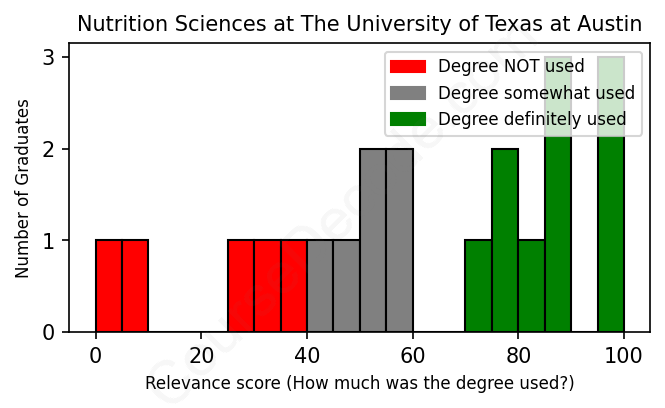
First, some facts. Of the Nutrition Sciences graduates from The University of Texas at Austin we've analyzed , here's how many have used (or NOT used) their degree in their career:

These are estimates based on AI analysis of 21 LinkedIn profiles (see below).
The verdict? Below average. Overall, with an average relevance score of 60%, Nutrition Sciences graduates from The University of Texas at Austin have a lower likelihood (-7%) of finding work in this field compared to the average graduate across all fields:
And for comparison, here's the chart for all profiles we've looked at across all degrees.
Also, after graduating, 66% of these graduates have pursued further education other than another Bachelor's degree (such as a Masters degree or other), compared to the average across all profiles of 35%. This suggests you may need more than just a Bachelors degree to be competitive as a Nutrition Sciences graduate.
See the details:
|
Relevance score: 100% We think this person has gone into a career highly relevant to their degree. We think this person has gone into a career highly relevant to their degree.
DEGREE INFOGraduated in 2019 from The University of Texas at Austin with a Bachelor of Science - BS in Nutrition Sciences. Also pursued further education since (see below). JOB HISTORY SINCE GRADUATIONNutrigenomics Stream Mentor The University of Texas at Austin - College of Natural Science May 2019 - Aug 2019 Graduate Research Assistant  University of Virginia Dec 2020 - May 2021 Intervention Specialist  University of North Carolina at Chapel Hill Mar 2021 - Sep 2021 Graduate Research Assistant  College of Natural Sciences, The University of Texas at Austin Jan 2024 - Present FURTHER DEGREES DONE SINCE GRADUATINGMaster of Public Health - MPHUniversity of North Carolina at Chapel Hill 2020 - 2022 Doctor of Philosophy - PhD The University of Texas at Austin 2022 - 2026 ABOUT[NAME REMOVED]s research is focused on Nutritional Sciences and Epidemiology in the context of maternal and child health. Her main interest is in Metabolic Syndrome (obesity, diabetes, and cardiovascular disease) as it pertains to eating behaviors and lifestyle determinants in underserved populations. Her academic and professional background in public health paired with research experience in pediatric clinical obesity, adult health program quality and implementation, and fatty acid biochemistry has led her to pursue an interdisciplinary approach to nutrition research. |
The top 10 most common jobs done by the graduates we've analyzed (ranked most common to least) are:
Here is a visual representation of the most common words in job titles for Nutrition Sciences graduates (this is across all Nutrition Sciences graduates we've analyzed, not just those who went to The University of Texas at Austin):

When we look at graduates from The University of Texas at Austin with a degree in Nutrition Sciences, it’s clear that their career trajectories can be pretty varied. A lot of them seem to initially land jobs that are not directly tied to nutrition, like marketing or administrative roles. For instance, some of the first jobs include being a supply chain management specialist or an IT support specialist. However, as time goes on, many of these individuals find their way back to the nutrition field, sometimes after detours through roles like dietetic intern or clinical positions. By the five to ten-year mark, a good number have transitioned into more relevant roles, like registered dietitians or clinical dietitians, showing that their education in nutrition is valuable and ultimately plays a significant role in their career paths.
That said, not all graduates stick strictly to nutrition-related careers. Some take their degrees into more general business or tech roles, showcasing a blend of skills that can span various industries. For example, there are graduates who have become marketing managers or operations specialists. But if you look at the longer-term careers, you’ll see a strong re-emergence of nutritionists and healthcare professionals, which suggests a solid foundation in the field that many do return to. Overall, while the early career paths might seem a little scattered, there’s a clear trend showing that alumni eventually gravitate back toward nutrition-centric roles as they gain experience and clarity on their passions. If you’re considering this field, just know that you might start in one place, but your knowledge in nutrition can open a lot of doors down the line!
Honestly, a Bachelor's degree in Nutrition Sciences can be a bit challenging, especially at a big university like The University of Texas at Austin. You're looking at a curriculum that includes a mix of science-heavy courses like biology, chemistry, and advanced nutrition, which can really test your studying skills. There's also a fair amount of writing and projects involved, so it requires good time management. That said, if you have a passion for the subject and stay organized, it’s definitely manageable. It's not ridiculously hard compared to some engineering or physics majors, but it does require commitment and a genuine interest in learning about health and nutrition!
Most commonly, in the LinkedIn profiles we've looked at, it takes people 4 years to finish a Bachelor degree in Nutrition Sciences.
Based on the job histories of these Nutrition Sciences graduates from the University of Texas at Austin, it looks like they've found a mix of decent and not-so-great salary situations. Some, like the graduates who became physician assistants or worked in higher-level marketing roles, are likely making pretty good money, reflecting the education and skills they picked up. Others, especially those in entry-level positions or internships, might not be raking it in just yet. It's a mixed bag really; for some, the career path seems promising with solid salaries ahead, while for others, it might take a bit longer to hit those money-making milestones. Overall, it seems like if you stick with it, particularly in the medical and nutrition fields, you’ve got a good shot at making decent money down the line!
Here is a visual representation of the most common words seen in the "about" section of LinkedIn profiles who have a Bachelor degree in Nutrition Sciences (this is across all Nutrition Sciences graduates we've analyzed, not just those who went to The University of Texas at Austin). This may or may not be useful:

Here are all colleges offering a Bachelor degree in Nutrition Sciences (ordered by the average relevance score of their Nutrition Sciences graduates, best to worst) where we have analyzed at least 10 of their graduates:
| College | Score | Count |
|---|---|---|
 University of Connecticut University of Connecticut
|
85 | 11 |
 Penn State University Penn State University
|
76 | 13 |
 California Polytechnic State University-San Luis Obispo California Polytechnic State University-San Luis Obispo
|
75 | 12 |
 University of New Hampshire University of New Hampshire
|
71 | 10 |
 Arizona State University Arizona State University
|
70 | 12 |
 Texas A&M University Texas A&M University
|
70 | 19 |
 The University of Texas at Austin The University of Texas at Austin
|
60 | 21 |
 Montclair State University Montclair State University
|
59 | 10 |
 Kaplan University Kaplan University
|
54 | 12 |
 University of Arizona University of Arizona
|
46 | 20 |